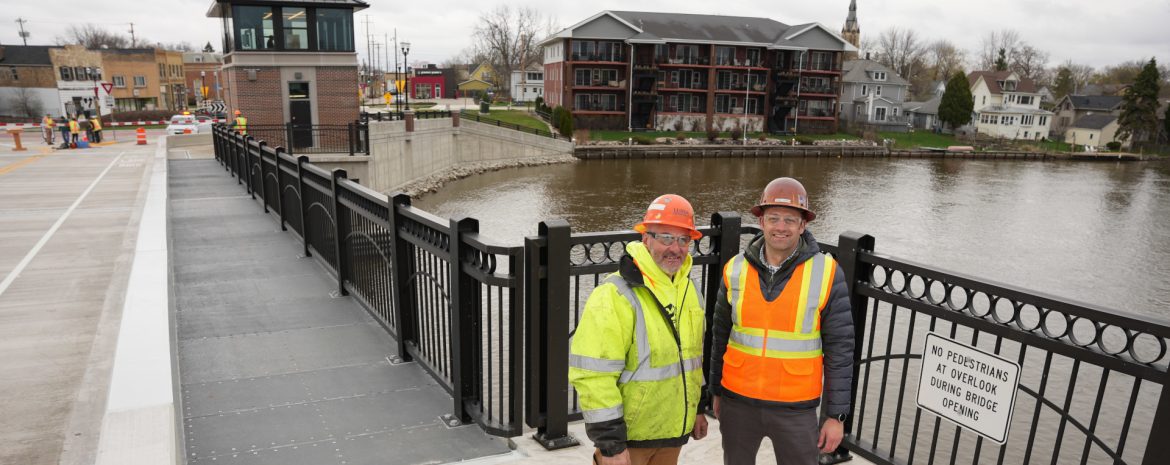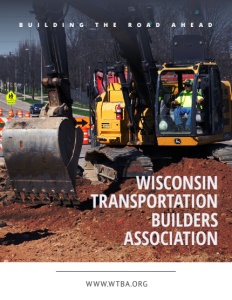Wisconsin Transportation Builders Association
building the road ahead
Built to Last: Wisconsin Transportation Builders Association’s expertise, longevity provide driving force behind state’s economy for nearly a century
Despite the gray skies and chilly wind that felt more like fall was on the way instead of summer, Mike Hahn felt the warm sense of pride as he looked at his team’s accomplishment.
“I mean that’s what we’re here for, right?” Hahn said moments before a crowd of several hundred people sang, cheered, and smiled for their new bridge, spanning the Menasha Channel about 20 miles south of Green Bay.
Hahn, who is Vice President of Lunda Construction and serves on the Wisconsin Transportation Builders Association Board of Directors, had just overseen the two-year install of a unique bascule lift bridge.
The $33 million project replaced a 70-year-old structure and will help connect Menasha’s downtown business district with a rapidly developing part of the city.
“We all want to provide a product that everybody’s proud of and the community can use,” Hahn explained.
Sure, not every project a Wisconsin Transportation Builders Association (WTBA) member works on gets the royal treatment (a ribbon cutting ceremony complete with cowbells, a marching band, and free food) Menasha provided this spring, but the concepts Association members turn from blueprints and specs into freeways, highways, and bridges literally drive Wisconsin’s economy and build its future.

Jeff Peterson
“The members are all pretty much family-owned businesses, so there’s decades of experience that – if they reach out to all of us – we can help them out with what we know. What’s happened in the past and what works, what doesn’t work,” WTBA Past-President Jeff Peterson said. “It’s a good organization.”
DECADES OF EXPERTISE
WTBA goes back more than 85 years, originally called the Wisconsin Road Builders Association.
Contractor companies (WTBA features nearly 90 as members) typically fall under five categories: asphalt and concrete pavers, earthmovers, bridge builders, and aggregate producers. Associate companies (more than 150 as of July 2023) provide a wide array of services ranging from work zone safety equipment, engineering support, and legal and financial guidance.
“It’s really an unparalleled resource for industry expertise, advocacy, and networking,” Zignego Company President Dan Zignego said. “WTBA is an irreplaceable partner for our organization.”
WTBA staffs an impressive team with decades of experience in engineering, budgets and fiscal policy, legal and regulatory knowledge, and government affairs.

Steve Baas
Executive Director Steve Baas leads them from the WTBA office, which is just across the street from the state Capitol in Madison.
That location isn’t random.
The Association, its Director of Government Affairs Elise Nelson, and WTBA’s contract lobbyist spend plenty of time with lawmakers – both in the halls of the Capitol and on the road in their home districts – advocating for the transportation industry on behalf of its members.
“From an economic standpoint, transportation infrastructure is like gravity: it is easy to take for granted but if you do the results can be catastrophic,” said Baas. “WTBA works hard to keep the public and policy makers alike informed about the impact our industry has on their daily lives and on the state’s economy.”
STATE BUDGET SUCCESSES
That hard work – all while bridging the gap between Republicans and Democrats in a purple state – tends to pay off.
The most recent victory came this summer when Democratic Governor Tony Evers signed a state budget that provides nearly $1 billion in additional funding for Wisconsin’s transportation infrastructure. The money will go toward expanding the Interstate system in Milwaukee, help Wisconsin partner with Minnesota to rebuild the vital Blatnik Bridge, and rebuild rural roads that are critical to the state’s agricultural sector.
“We’ve had a lot of good transportation motions since I’ve been on this committee, but this might be the best one yet,” State Rep. Mark Born (R-Beaver Dam) said just before his Joint Finance Committee voted to approve the funding.
While nothing is guaranteed, WTBA members tend to win a vast majority of transportation projects the state Department of Transportation opens for bids every month. With a $7.6 billion transportation budget over the next two years, WisDOT’s investment in such projects pays dividends in every sector.
Last year, 67% of the value of freight shipped in Wisconsin crossed the state via truck, showing the importance of not only a dependable Interstate system, but quality local roads to help shipments reach their “last mile” destinations.
According to the national research group TRIP, the design, construction, and maintenance of transportation infrastructure in Wisconsin supports approximately 64,000 full-time jobs across all sectors of the state’s economy. TRIP estimates 1.4 million full-time jobs in key Wisconsin industries such as tourism, retail sales, agriculture, and manufacturing are completely dependent on the state’s transportation network.

JR Ramthun
“As a contractor building the project, you don’t often think about the economic impact,” WTBA President JR Ramthun said. “That is, until you see the finished product and the free flow of traffic getting to their destination. It sure makes you proud that you and other WTBA contractors made a difference.”
A COMMITMENT TO CONNECTIONS
The industry isn’t immune to the stresses all employers face right now. WTBA’s goal is to ensure members can count on stable, consistent program funding so workers know they can build a career around the transportation industry.
To that extent, WTBA member companies have redoubled their efforts within apprenticeship programs, recruiting, and at career fairs to ensure work crews are fully staffed.
That includes Association members participating in things like WisDOT’s Highway Skills Contractor Training (HSCT), a six-week course that connects job seekers with transportation construction contractors, many willing to hire and place an employee on-site within a matter of a week.
“They overcome the struggle of thinking that they aren’t going to be good enough or that they won’t be successful because these contractors will help them to learn those skills and to be successful. They just have to want it,” HCST Southwest Coordinator Lorie Thompson said during a recent “speed networking” event featuring a handful of WTBA companies.
The WTBA also connects industry experts at a wide variety of events and conventions throughout the year.
“All these events that the WTBA does just brings everybody together and I keep saying: the face-to-face time is so important,” Ramthun said.
ROADMAP FOR THE FUTURE?
The next story of Wisconsin’s transportation industry is unwritten. There are signs it’ll be a positive one, including the federal Bipartisan Infrastructure Law providing Wisconsin with about $1 billion in additional road and bridge funding over the next five years. There are other signs, like construction inflation surging 18.7% in Wisconsin in fiscal year 2022, that could point to some hurdles for contractors.
But there’s one thing for certain: WTBA is poised to build on its past successes to help shape a brighter future.
“(WTBA) is one of our most-active chapters,” American Road and Transportation Builders Association (ARTBA) General Counsel Rich Juliano said.
“We can’t tell the story – good or bad – about what’s going on with transportation investment and policy on the federal level without being in touch with our state groups, with our contractors, with our other members, because they can tell the story the best.”
AT A GLANCE
Wisconsin Transportation Builders Association (WTBA)
WHAT: A leadingAssociation that keeps the issues of its members in full view through advocacy and open dialogue
WHERE: Wisconsin, USA
WEBSITE: https://wtba.org/


